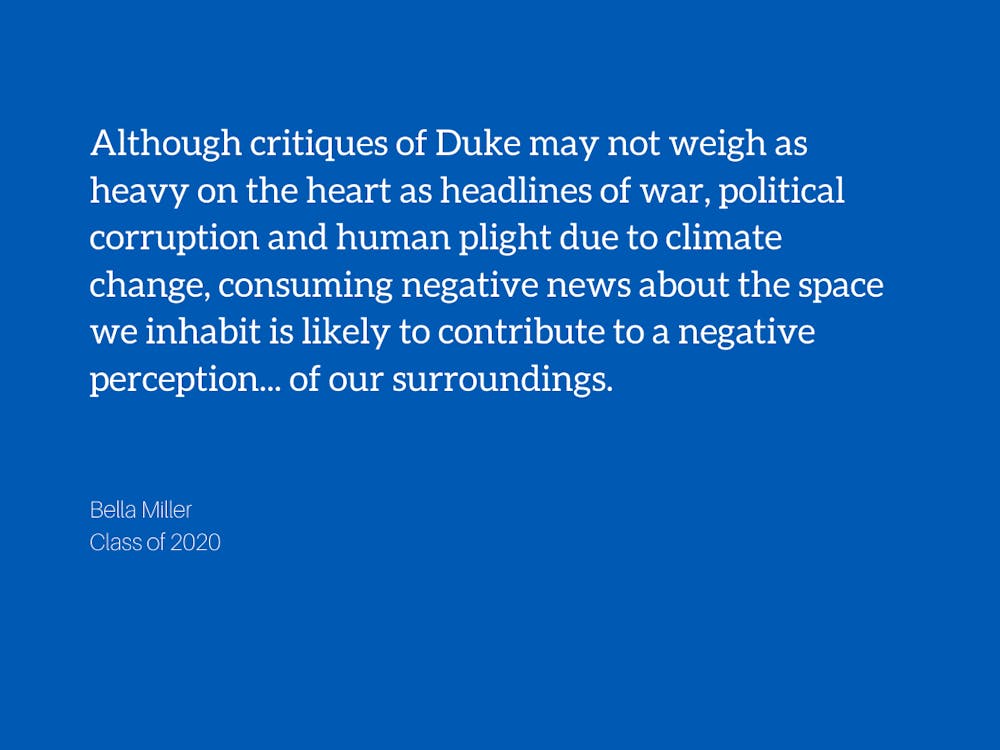The Chronicle Opinion section has a reputation for being a sounding board for complaints—and rightly so. Every day, opinion writers (myself included) release new pieces slamming Duke, its faculty or its students.
This work, I believe, is part of what makes the Chronicle so important—it is highly critical of how we function as a powerful institution. We should interrogate and critique the power hungry finance and consulting culture, toxic masculinity and rampant “effortless perfection” on campus. Nonetheless, I think the opinion section is on the verge of being a homogenous outlet for campus critique.
This is not unique to the Chronicle, as the majority of news sources present their consumers with stories of disaster, corruption, and violence. With this in mind, the impossible question is whether or not the majority of the world’s happenings are actually that… negative.
Worryingly, a high proportion of negative news is capable of distorting our perceptions of the world. Psychologists Amos Tversky and Daniel Kahneman coined the term, “availability heuristic,” people’s estimate of the probability or frequency of an event based on the ease with which it comes to mind. When people are presented day after day with stories on shootings, murders, airplane crashes and kidnappings, they are likely to assume these improbable events present an imminent danger, eliciting constant anxiety and paranoia.
While these are tragic realities of the world, news outlets are more inclined to present readers with news likely to trigger an emotionally negative reaction. The amygdala, the fear and rage response center in our brains, scans our sensory input, remaining alert of any potential dangers.
The amygdala may be critical to our survival, but it calls our attention to negative news coverage. Consequently, the world’s many evils get wrapped into click-bait, or, “something (such as a headline) designed to make readers want to click on it.”
As a result, readers are inundated every day with countless headlines of the latest manifestations of evil in the world and offered little evidence of its many joys. This is not to say that atrocities are rare, but rather, that for every noted horror story, there is an unwritten, unnoted story of love and happiness.
Research shows that the cost of this hyper-consumption of negative news can contribute to issues such as agoraphobia, social anxiety, post-traumatic stress disorder, insomnia, religious and racial intolerance and depression. While there is an artillery of data proving the detrimental effects of this phenomenon, it seems intuitive that as empathetic social creatures, we feel pain and anxiety when confronted with an infinite daily stream of human suffering.
While the Chronicle and its reporters and columnists are not in pursuit of providing click-bait, the presentation and consumption of bad news without account of the good runs rampant in both the Opinion and News sections of the Chronicle. We as columnists and reporters, perhaps unintentionally, model what we see from professional news sources. Plus, Duke, being the problematic institution that it is, is an easy target.
If someone who doesn’t go to Duke was to learn about our school through the lens of the Chronicle, they might assume its students to be a miserable bunch, learning from ignorant professors, studying at an institution that corroborates evil powers in support of ICE, all within a social culture that breeds exclusivity and greed. While these are realities, they do not tell the full story.
For every hate group or immoral person who comes to speak at Duke, there is an altruistic group and a speaker in pursuit of peace and justice. These just don’t make the headlines.
For every scamming researcher, there are over a thousand researchers pursuing ethical work. While it makes perfect sense for a disturbance of the peace to make a headline, the peace itself should be highlighted, too
Although critiques of Duke may not weigh as heavy on the heart as headlines of war, political corruption and human plight due to climate change, consuming negative news about the space we inhabit is likely to contribute to a negative perception, or negative “availability heuristic” of our surroundings.
The Chronicle could be a source of celebration of the joy, love and greatness that exist at Duke just as much as it is a platform to expose its problems. It’s time I do a better job of striking a balance.
Bella Miller is a Trinity senior. Her column, “make Duke weird,” runs on alternate Tuesdays.
Get The Chronicle straight to your inbox
Signup for our weekly newsletter. Cancel at any time.

